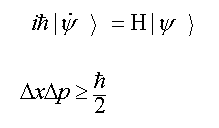Frank Tipler co-authored a book with John Barrow entitled The Anthropic Cosmological Principle which was a peer-reviewed book published by Oxford University in 1987.
The principle thesis:
Intelligent information-processing must come into existence in the Universe, and, once it comes into existence, it will never die out.
They derive the thesis from Schrodinger’s equation

From Schrodinger’s equation they derive the following formula:

which predicts, through physical first principles alone, at the end of time that there must be an Intelligent Entity that is conscious, all-powerful, all-knowing, non-material, eternal. By all counts, such an entity would properly be called, “God”.
Tipler says in Dembski’s book Uncommon Dissent
(the chapter is available for free at ISCID at the link Tipler on Peer Review):
A recent poll of the members of the National Academy of Sciences, published in Scientific American, indicated that more than ninety percent are atheists. These men and women have built their entire worldview on atheism. They would be exceedingly reluctant to admit that any result of science could be valid if it even suggested that God could exist.
I discovered this the hard way when I published my book The Physics of Immortality. The entire book is devoted to describing what the known laws of physics predict the far future of the universe will be like. Not once in the entire book do I use anything but the known physical laws, the laws of physics that are in all the textbooks, and which agree with all experiments conducted to date. Unfortunately, in the book I gave reasons for believing that the final state of the universeâ€â€a state outside of space and time, and not materialâ€â€should be identified with the Judeo-Christian God. (It would take a book to explain why!) My scientific colleagues, atheists to a man, were outraged. Even though the theory of the final state of the universe involved only known physics, my fellow physicists refused even to discuss the theory. If the known laws of physics imply that God exists, then in their opinion, this can only mean that the laws of physics have to be wrong. This past September, at a conference held at Windsor Castle, I asked the well known cosmologist Paul Davies what he thought of my theory. He replied that he could find nothing wrong with it mathematically, but he asked what justified my assumption that the known laws of physics were correct. At the same conference, the famous physicist Freeman Dyson refused to discuss my theoryâ€â€period. I would not encounter such refusals if I had not chosen to point out my theory’s theological implications.
….
As a physicist, I am aware that quantum mechanics, the central theory of modern physics, is even more deterministic that was the classical mechanics of which Darwin was aware. More than this, quantum mechanics is actually teleological, though physicists don’t use this loaded word (we call it “unitarity†instead of “teleologyâ€Â). That is, quantum mechanics says that it is completely correct to say that the universe’s evolution is determined not by how it started in the Big Bang, but by the final state of the universe. Every stage of universal history, including every stage of biological and human history, is determined by the ultimate goal of the universe. And if I am correct that the universal final state is indeed God, then every stage of universal history, in particular every mutation that has ever occurred, or ever will occur in any living being, is determined by the action of God.
Though I do not agree with all of Tipler’s ideas (forgive me Frank), the derivation from the Schrodinger equation above has been found reasonable by various scholars. And certainly having someone of John Barrow’s reputation as the principle co-author of the book where the derivation was originally given certainly lends a degree of respectability to the idea.
A reasonable possibility from physical laws alone is that ID has a Designer available at the cosmological scale. ID cannot answer whether the Designer of the cosmos is also directly the author of life. For example, we can say Rachmaninoff composed the famous Rachmaninoff 2nd Concerto. If God made Rachmaninoff’s ancestors, does this mean we can say God designed the Rachmaninoff 2nd? In like manner, we can’t be too quick to say God is the direct author of life even though the laws of physics may predict His existence. ID can only suggest that something is designed. However knowing, through the laws of physics, that God may exist, it certainly makes the design inference a little more palatable.
Salvador Cordova